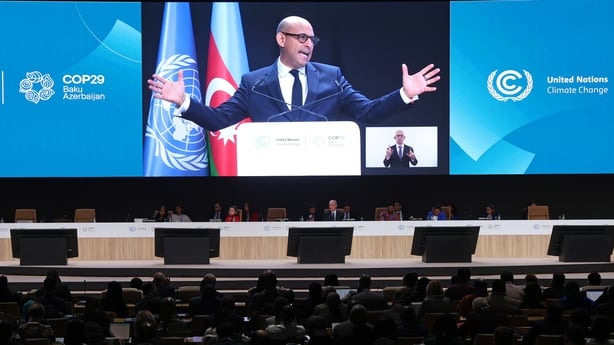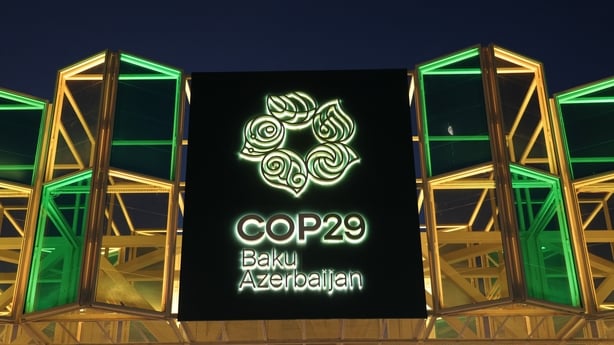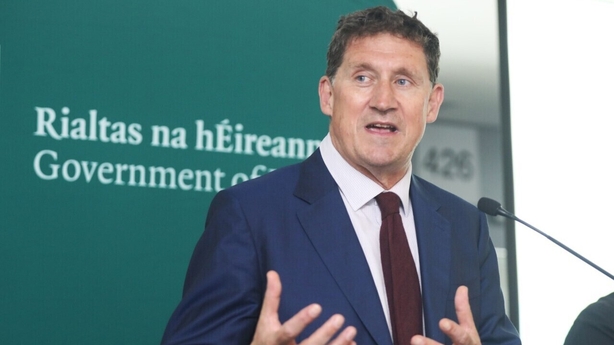Governments at the COP29 talks have approved new standards from the United Nations for international carbon markets in a key step towards allowing countries to trade credits to meet their climate targets.
On the opening day of the UN climate negotiations in Azerbaijan, nearly 200 nations agreed a number of crucial ground rules for setting a market in motion after almost a decade of complex discussions.
COP29 President Mukhtar Babayev hailed the "breakthrough" but said that more work is needed.
Other key aspects of the overall framework still need to be negotiated, experts said, but the decision brings closer a long-sought UN-backed market trading in high-quality credits.
"It's hugely significant," according to Erika Lennon, from the Center for International Environmental Law (CIEL), who said it would "open the door" for a fully-fledged market.
Carbon credits are generated by activities that reduce or avoid planet-heating greenhouse gas emissions, such as planting trees, protecting carbon sinks or replacing polluting coal with clean-energy alternatives.
One credit equals one tonne of prevented or removed heat-trapping carbon dioxide.
Since the Paris Agreement in 2015, the UN has been working on rules to allow countries and businesses to exchange credits in a transparent and credible market.
The benchmarks adopted in Azerbaijan's capital Baku will allow for the development of rules including calculating how many credits a given project can receive.
Once up and running, a carbon market would allow countries - mainly wealthy polluters - to offset emissions by purchasing credits from nations that have cut greenhouse gases above what they promised.
The purchasing countries could then put carbon credits towards achieving the climate goals promised in their national plans.

"It gets the system a big step closer to actually existing in the real world," said Gilles Dufrasne from think tank Carbon Market Watch.
"But even with this, it doesn't mean the market actually exists," he added, saying further safeguards and questions around governance remain unanswered.
An earlier UN attempt to regulate carbon markets under the Paris accord were rejected in Dubai in 2023 by the European Union and developing nations for being too lax.
Some observers were unhappy that the decision in Baku left unresolved other long-standing and crucial aspects of the broader crediting mechanism, known in UN terms as Article 6.
"It's not possible to declare victory," said a European diplomat, speaking on condition of anonymity.
There are hopes that a robust and credible UN carbon market could eventually indirectly raise the standards of the scandal-hit voluntary trade in credits.
Corporations wanting to offset their emissions and make claims of carbon neutrality have been major buyers of these credits, which are bought and exchanged but lack common standards.
But the voluntary market has been rocked by scandals in recent years amid accusations that some credits sold did not reduce emissions as promised, or that projects exploited local communities.
Ms Lennon said even if a carbon market had integrity "if what you are doing is offsetting ongoing fossil fuels with some sort of credit, you're not actually reducing anything".
US climate action won't end with Trump, envoy tells COP29
The top US climate envoy at the talks sought to reassure countries that the re-election of Donald Trump would not end his country's efforts to tackle global warming.
Mr Trump's win has cast a long shadow over the negotiations as he has pledged to withdraw Washington from the Paris Agreement.
The result has left the US delegation somewhat hamstrung and stoked fears that other states could be less ambitious in a fractious debate on increasing climate funding for developing nations.

US envoy John Podesta acknowledged the next administration would "try and take a U-turn" on climate action, but said that cities, states and individual citizens would pick up the slack.
"While the United States federal government under Donald Trump may put climate change action on the back burner, the work to contain climate change is going to continue in the United States with commitment and passion and belief," he said.
"The fight is bigger than one election, one political cycle in one country."
The Baku talks opened with Executive Secretary of the UN Framework Convention on Climate Change Simon Stiell urging countries to "show that global cooperation is not down for the count."
Things got off to a rocky start, with feuds over the official agenda delaying by hours the start of formal proceedings.
Climate debt main item on agenda
The main item up for discussion is increasing a target to help developing nations prepare for worsening climate impacts and wean their economies off fossil fuels to €94bn a year.
How much will be on offer, who will pay, and who can access the funds are some of the major points of contention.
Mr Babayev acknowledged the need was "in the trillions" but said a more "realistic goal" was somewhere in the hundreds of billions.
"These negotiations are complex and difficult," the former executive of Azerbaijan's national oil company said at the opening of the summit.
Developing countries warn that without adequate finance, they will struggle to offer ambitious updates to their climate goals, which countries are required to submit by early next year.
"The global north owes the global south a climate debt," said Executive Director of Climate Action Network Tasneem Essop.
"We will not leave this COP if the ambition level on the finance ... doesn't match the scale at which finance must be delivered."
Mr Stiell warned rich countries to "dispense with any idea that climate finance is charity."
"An ambitious new climate finance goal is entirely in the self-interest of every nation, including the largest and wealthiest," he said.
Paris Agreement goals in 'great peril' - UN
The small group of developed countries that currently contributes the money wants the donor pool expanded to include other rich nations and top emitters, including China and the Gulf states, something firmly rejected by Beijing.
Just a handful of leaders from the Group of 20, whose countries account for nearly 80% of global emissions, are attending COP29. US President Joe Biden is staying away.
Afghanistan is present for the first time since the Taliban took power, as guests of the host Azerbaijan but not party to the talks.
With Afghanistan among the countries most vulnerable to global warming, the Taliban has argued that its political isolation should not prevent it from attending international climate talks.
Read more:
COP29: What is expected from talks as Azerbaijan awaits delegates?
This meeting comes after fresh warnings that the world is far off track to meet the goals of the Paris Agreement.
The UN said that 2024 is likely to break new temperature records, and the Paris goals are "in great peril".
The period from 2015 to 2024 will also be the warmest decade recorded, the World Meteorological Organization said in a report.
The climate deal commits to keep warming below 2C compared to pre-industrial levels, preferably below 1.5C.
If the world tops that level this year, it would not be an immediate breach of the Paris deal, which measures temperatures over decades.
But it suggests that much greater climate action is needed.
Last month, the UN warned the world is on a path towards a catastrophic 3.1C of warming this century based on current actions.
More than 51,000 people are expected at COP29 talks, which continue until 22 November.

Minister for the Environment Eamon Ryan has been given a key role by the COP29 Presidency to help identify and remove blockages and obstacles that might prevent an overall agreement.
The former Green Party leader has been appointed, along with his ministerial counterpart from Costa Rica, Franz Tattenbach, to work with negotiating countries and blocs such as the European Union and the Small Island Developing States to identify and overcome barriers to a final agreement.
Mr Ryan said that securing a climate finance agreement is a red line issue for the most vulnerable countries as developing nations want fairness not freebies.
Additional reporting George Lee


